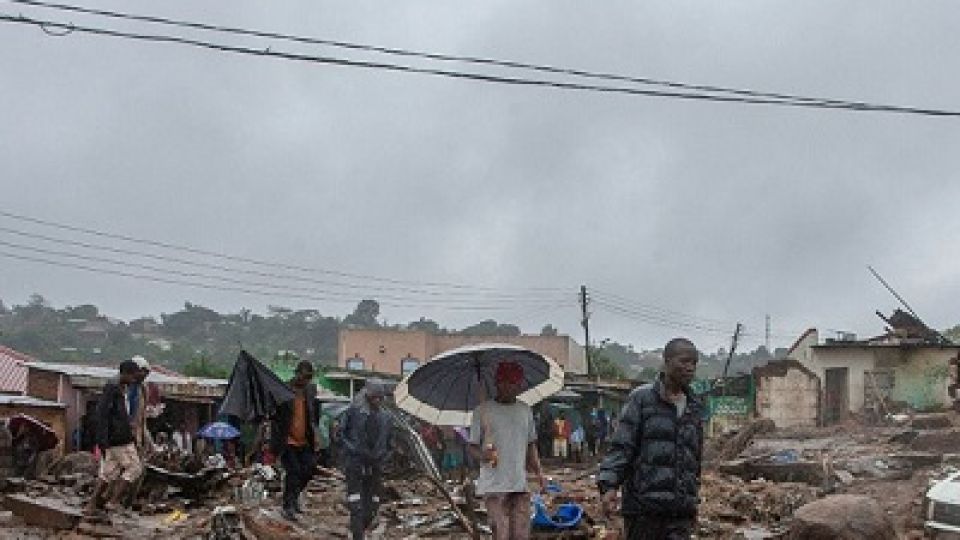from MAVHUTO BANDA in Lilongwe, Malawi
Malawi Bureau
LILONGWE, (CAJ News) – HUMANITARIAN organizations are making frantic efforts to curtail a multipronged catastrophe as the impact of the Tropical Storm Freddy hits home.
The subsequent lack of sanitation and clean water sources, which increases the risk of contracting cholera, will be amplified after many homes have been washed away leaving displaced communities to be housed in makeshift camps.
They ought to be counting themselves lucky, amid their tribulations, as around 500 others died when the cyclone swept through Southern Malawi from March 12.
The death toll, which stands at 499 at last count (March 20), will most probably rise in the coming days as 427 people are still unaccounted for, since some areas remain cut off due to relentless rain and fierce wind. At least 1 300 people are injured
Set to be the longest tropical system in about 30 years, Freddy has condemned 101 648 households (approximately 508 244 people) to 534 camps set up to accommodate the displaced, according to the Department of Disaster Management Affairs (DODMA).
Over 140 000 of those displaced are children.
The Red Cross is wary the number of people living in camps may cause them to become hotspots for cholera and other waterborne diseases.
Already, Malawi is contending with its worst cholera outbreak that has left more than 1 600 people dead from over 51 500 cases documented since late 2022.
In addition to risks of cholera, floods have cut off many communities food for many days, as well as causing widespread damage to farms and death of livestock.
Agencies lamented that many of these areas were already suffering from significant food insecurity.
The International Federation of the Red Cross and Red Crescent Societies (IFRC) and its membership has launched an emergency appeal seeking Swiss ₣6 million (US$6,5 million), which will help the MRCS to assist up to 160 000 people over five districts worst affected by Freddy.
“The destruction left behind by Tropical Storm Freddy, which has displaced large numbers is a major concern, as we are also tackling a widespread cholera outbreak at the same time,” said John Roche, Head of IFRC’s Delegation for Malawi, Zambia and Zimbabwe.
He added, “We need to respond fast and ensure people have access to clean and safe drinking water to ensure that cholera does not spread beyond control.”
The response will focus on the immediate needs of families displaced and hosted in camps.
IFRC disclosed the Malawi Red Cross Society (MRCS) was on the ground, with volunteers working in dangerous conditions, primarily conducting search and rescue by land and in rescue boats.
Volunteers are providing first aid and psychosocial support to those affected.
The International Organisation for Migration (IOM), alongside other United Nations (UN) agencies are working with the government of Malawi to support those affected in accommodation centres across flood-affected areas.
A majority are in Chikwawa, Mulanje and Nsanje districts.
More than 1 000 people had been evacuated.
“The people of Malawi are facing a catastrophic yet another disaster with a potential long-lasting effect,” lamented Antonio Vitorino, IOM Director General.
“It is important that we urgently reach the affected communities as the needs grow by the hour,” Vitorino added.
IOM has called for immediate lifesaving assistance to respond to the current needs and the development of durable solutions in sustainably averting, minimizing and addressing disaster displacement including through climate adaptation measures, preparedness and disaster risk reduction.
Meanwhile, Freddy has triggered an education crisis.
An unspecified number of children are among those dead.
More than 490 000 primary and secondary school aged children – about 5 percent of children – are unable to attend school due to the damage caused by Freddy, Save the Children said.
Many schools are projected to remain closed for the next four weeks at least.
About 230 schools that survived the cyclone are now offering temporary accommodation to some of the displaced people.
Roads need to be cleared so children can safely travel to school.
Schools were due to open on Monday this week but this was not feasible.
The-opening of schools is now scheduled for April 17.
This comes on top of school closures at the start of the year as a result of a cholera outbreak and at the height of the COVID-19.
“In the aftermath of a disaster like Cyclone Freddy, children still have a right to an education, but sadly it’s rarely viewed as a priority,” Ashebir Debebe, Save the Children’s Malawi Country Director, said.
The official noted funding is urgently needed to rehabilitate schools and roads.
“Children in Malawi have been through so much, with the cholera outbreak, followed by Cyclone Freddy. They need to get back to the classroom,” Debebe said.
– CAJ News

